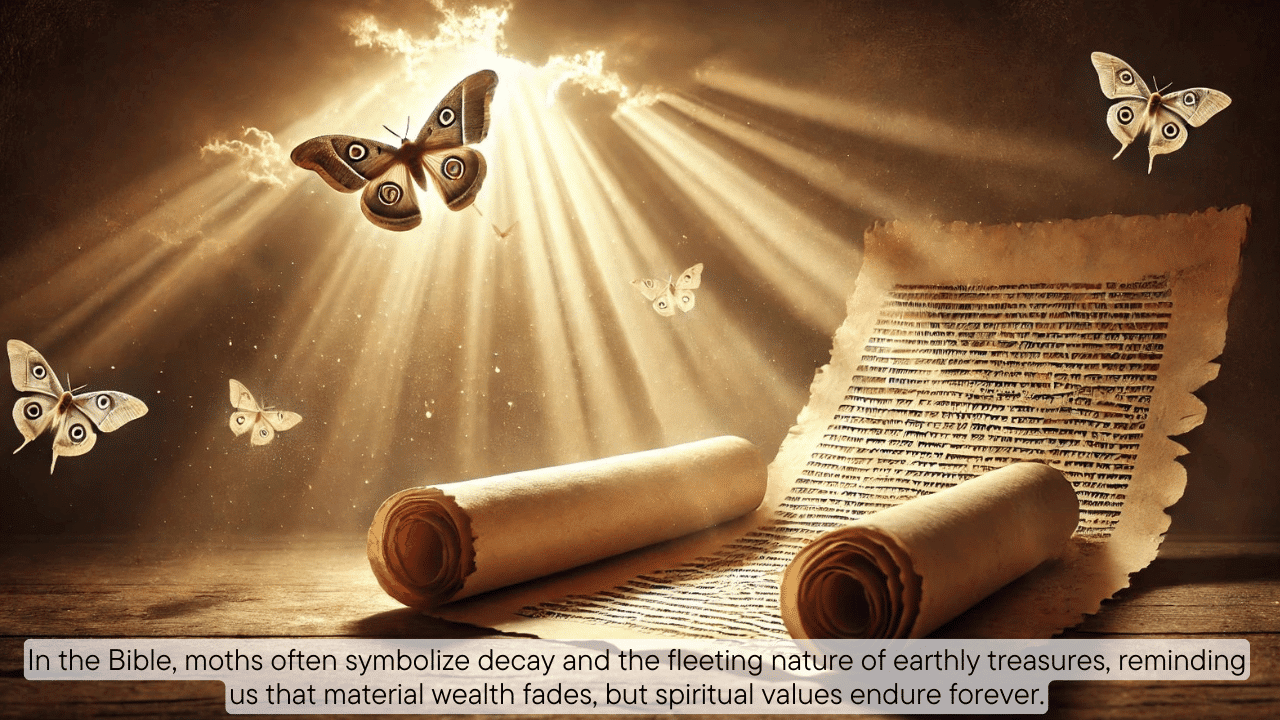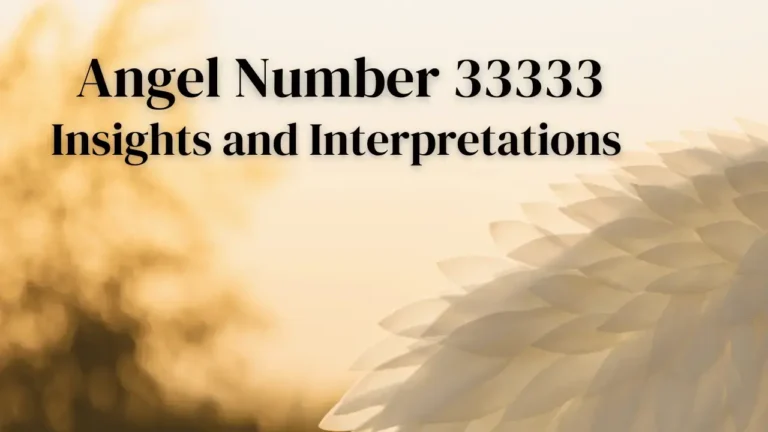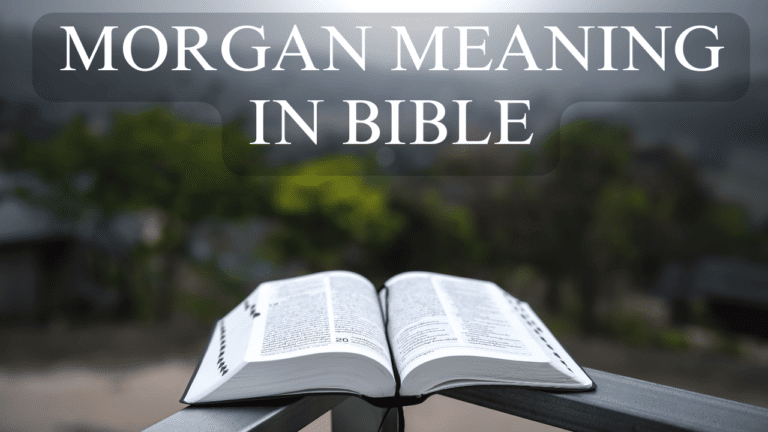Moths: Biblical Insights into Its Meaning and Significance
In the Bible, moths are often used as symbols of decay and destruction, representing the fleeting nature of earthly possessions. For instance, in Matthew 6:19-20, Jesus warns against storing treasures on earth, where “moths and rust destroy.”
This highlights the idea that material wealth is temporary and vulnerable, unlike spiritual treasures, which are eternal. Moths remind us to focus on things that last—our relationship with God and living a righteous life—rather than being consumed by temporary gains. They serve as a gentle but powerful reminder to seek lasting value in the spiritual realm.
Moths, delicate creatures often associated with darkness and destruction, hold a deeper significance within biblical scriptures. Throughout the Bible, moths symbolise vulnerability, decay, and the fleeting nature of material possessions. These seemingly insignificant insects teach profound lessons about faith, spirituality, and the impermanence of worldly goods.
In this blog post, we will explore the meaning of moths in the Bible, their symbolic significance, and the spiritual lessons we can draw from these tiny creatures. We’ll also delve into how moths are used as metaphors and what they represent in different biblical contexts.
What Do Moths Symbolize in the Bible?
Throughout scripture, moths are consistently used as symbols of destruction and decay. Their primary appearance in the Bible carries a negative connotation, often highlighting the futility of valuing material wealth and worldly possessions.
Key Biblical Themes Associated with Moths:
- Destruction of Wealth: Moths represent the eventual destruction of material possessions.
- Human Mortality: Just as moths are fragile, human life is transient and impermanent.
- Judgment and Consequence: Moths illustrate the consequences of living a life focused on materialism rather than faith and righteousness.
Relevant Bible Verses
There are several significant passages in both the Old and New Testaments where moths are mentioned. Let’s examine these verses to understand the role of moths in biblical teaching:
Matthew 6:19-20 (NIV):
- “Do not store up for yourselves treasures on earth, where moths and vermin destroy, and where thieves break in and steal. But store up for yourselves treasures in heaven, where moths and vermin do not destroy, and where thieves do not break in and steal.”
- Here, Jesus warns against placing value on earthly treasures that moths can easily consume. The focus is on the importance of heavenly treasures, which are eternal and immune to decay.
Isaiah 50:9 (NIV):
- “It is the Sovereign Lord who helps me. Who will condemn me? They will all wear out like a garment; the moths will eat them up.”
- In this verse, moths symbolize the inevitable destruction of the wicked, showing the fragility of life and the eventual decay of all that is not aligned with God.
Job 13:28 (NIV):
- “So man wastes away like something rotten, like a garment eaten by moths.”
- Job reflects on human frailty, comparing human life to garments slowly consumed by moths, emphasizing life’s impermanence.
Spiritual Significance of Moths
The spiritual meaning of moths in the Bible centres on two primary themes: impermanence and materialism. Moths, with their ability to silently destroy garments, serve as a metaphor for the invisible forces that can corrupt a person’s soul or undermine faith.
Impermanence of Material Goods
Moths are often associated with material possessions. Just as moths eat away at fabric, time and circumstances eat away at wealth, status, and earthly treasures. This concept is repeatedly emphasized in the Bible, urging believers to focus on spiritual rather than material wealth.
Judgment and Consequence
Moths appear as symbols of judgment, representing that those who stray from a path of righteousness will face inevitable consequences. In some scriptures, moths are likened to God’s judgment on the wicked or unrepentant, reminding us that a life not lived by God’s will is bound to deteriorate.
Mortality and the Fragility of Life
The image of moths eating garments evokes thoughts of human mortality. Just as moths destroy what seems secure and durable, our lives are similarly fragile and subject to decay. Moths serve as a gentle but sobering reminder that our time on earth is limited, and our focus should be on eternal life rather than fleeting earthly pursuits.
Lessons We Can Learn from Moths in the Bible
Moths may seem like a small and insignificant aspect of biblical imagery, but they offer profound lessons:
Don’t Put Your Faith in Material Wealth
- As emphasized in Matthew 6:19-20, material possessions are fleeting and vulnerable to decay.
- True security comes from investing in spiritual treasures that moths and thieves cannot destroy.
Recognize the Fragility of Life
- Life is temporary, just like a garment eaten by moths. This awareness should prompt us to live according to our faith and values.
Focus on Eternal Rewards
- Earthly achievements, no matter how grand, are temporary. Moths serve as reminders to pursue spiritual growth, which is lasting and eternal.
Judgment is Inevitable
- Moths, as agents of decay, symbolize the inevitable judgment that awaits those who stray from the path of righteousness.
Moth Metaphors and Symbolism in the Bible
In addition to their literal destruction of material goods, moths are frequently used as metaphors for spiritual lessons throughout the Bible. Some key metaphors include:
The Silent Destroyer
Moths work silently and gradually, compared to how sin or neglect of faith can slowly eat away at a person’s spiritual well-being.
A Warning Against Complacency
Just as garments can appear fine on the surface while being eaten away by moths, a person’s life may seem secure even as spiritual decay sets in. This metaphor serves as a warning against complacency in one’s faith.
The Temporary Nature of Human Life
Like moths that consume garments, human life is subject to decay and death. The Bible reminds us to live humbly and aware of our finite time on earth.
FAQs About Moths and Their Biblical Significance
1. Why are moths mentioned in the Bible?
Moths are used in the Bible to symbolize destruction, decay, and the transient nature of earthly possessions. They remind us of the impermanence of material wealth and the importance of focusing on spiritual growth.
2. What is the spiritual lesson from moths in the Bible?
The spiritual lesson from moths is that material possessions are fleeting and life is fragile. The Bible encourages believers to prioritize eternal treasures in heaven rather than earthly goods that can be destroyed by moths or other forces of decay.
3. Are moths a symbol of judgment in the Bible?
Yes, moths often symbolize divine judgment and the inevitable consequences of a life focused on materialism or sin. Their ability to quietly destroy is a metaphor for the judgment that comes to those who stray from righteousness.
4. How does the Bible use moths to teach about materialism?
The Bible uses moths to teach that materialism is futile because earthly treasures are subject to decay. In contrast, spiritual wealth—such as faith and good deeds—endures eternally and cannot be destroyed by moths or other forces.
5. What can we learn from the moth in Matthew 6:19-20?
Matthew 6:19-20 teaches that material wealth is temporary and vulnerable to destruction, while spiritual wealth is eternal and secure. Moths, in this context, are a symbol of the fragility of material possessions.
Conclusion: Moths as Symbols of Spiritual Truths
Moths may be small and easily overlooked, but their biblical significance is profound. These creatures serve as metaphors for the fleeting nature of material wealth, the fragility of life, and the consequences of spiritual neglect. The Bible’s references to moths remind us to focus on building spiritual treasures that cannot be destroyed by time or decay.
By embracing the lessons taught through the symbolism of moths, we are encouraged to live with greater purpose, humility, and spiritual focus. Moths, though tiny and destructive, offer powerful insights into the human condition and our relationship with the divine.








